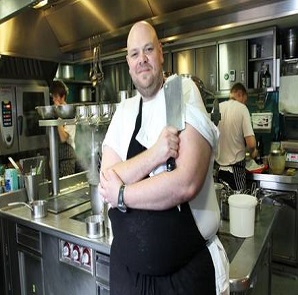 You could call them “Michelinns”: the new breed of pubs putting the “inn” into Michelin with their star-studded dishes and awards aplenty. Their chef-in-chief is Tom Kerridge, the proprietor of the double-starred Hand and Flowers, last week voted Britain’s best restaurant despite its being, technically, a pub.
You could call them “Michelinns”: the new breed of pubs putting the “inn” into Michelin with their star-studded dishes and awards aplenty. Their chef-in-chief is Tom Kerridge, the proprietor of the double-starred Hand and Flowers, last week voted Britain’s best restaurant despite its being, technically, a pub.
His new guide to cooking what he calls “proper pub food”, which is also the name of his BBC cooking show, is the talk of taverns up and down the country as publicans pledge to overhaul their menus in an attempt to ape his success. Proper Pub Food, which features the larger-than-life Kerridge on the front cover, is selling faster than portions of his famed slow-cooked duck breast: it was one of only five books to amass sales of more than £100,000 last week and was, at one point, outselling even the new Bridget Jones. Jamie who?
From the Red Lion at Britwell Salome in Oxfordshire, to the Hogget in Hook, Hampshire, pub owners can’t get enough of the big man from the West Country. Paul Whitbread, who runs The Royal Oak in Leighterton, Gloucestershire, said Kerridge’s was “the sort of cooking we aspire to”, adding: “We’re certainly taking a lot of inspiration from the book.” The Hogget’s Tom Faulkner said: “I think we’ll all take elements of that book and do our own thing.”
They’re not the only fans. Last Monday night, Tom Kerridge capped what has been quite a year by winning the National Restaurant Awards. The award had added piquancy because it is voted for by 150 industry professionals, which means, says the chef, that The Hand and Flowers is “where they’d like to go on their days off”. That means everything to the 40-year-old, who describes himself as the ultimate “jeans and white trainers guy”.
“I wanted it to be somewhere I could sit and feel very comfortable and enjoy being me without worrying about what everybody thinks about what I’m wearing.” The same goes for everyone, from Marlow FC-supporting locals to someone in “plumber’s overalls. They should all be more than welcome to sit down.”
Kerridge’s joint was the frontrunner in a growing number of pubs to feature on the list of 100 best restaurants. The Sportsman, near Whitstable in Kent, was ranked seventh; its chef, Stephen Harris, won the coveted Chef’s Choice award. The best restaurant in Wales, The Hardwick, in Abergavenny, is another pub, as are The Royal Oak, near Maidenhead, Berkshire, East Yorkshire’s Pipe and Glass, The Star at Harome, North Yorkshire, and the Green Man & French Horn in central London.
Will Drew, editor of Restaurant, the organiser of the awards, said Mr Kerridge’s victory “reflected the casualisation of dining”. He added: “People have high standards of food, but they don’t want an old-fashioned, formal environment. [Kerridge’s] pub classics, elevated several degrees to match restaurant cooking, epitomise that shift.”
Kerridge picks an omelette as “probably” his favourite dish on his menu: “It’s the same every time, again, and again, and again. Just four ingredients: eggs, parmesan, beautiful smoked haddock and a hollandaise glaze, treated beautifully. It’s been there since the start, which means when we opened it was a two-star dish; I love that. It’s a good reflection of what we do.”
He reckons his two Michelin stars, unique for a publican, boil down to his team’s unfailing consistency, spiced with a little of his own individuality. “The menu doesn’t change very often,” he said. “We don’t have blackboard specials. I get excited about serving 65 covers exactly the same at lunch and dinner.”
His BBC2 series is proving popular, although critics have suggested the recipes, some of which need to be started three days before they are served, are a bit “fancy”. His retort? “If your version of pub food is microwaving a pie and some baked beans, then yeah, it’s really complicated cooking. But if it’s just about getting the best out of simple ingredients, then it’s not. Pub food has to change. Pubs should be slow-cooking things so they can use slightly cheaper ingredients and offer great value for money and great food.”
Or, to use a true Kerridgeism, “proper lush” food. He laughs when I pull him up on the fact that he hasn’t said “lush” once during our chat, yet his show is peppered with the term. “I was trying to be eloquent! Put food in front of us and I use the words ‘lush’ and ‘proper’ all the time. ‘Lush’ was used all the time in the West Country when I was growing up. I didn’t realise I was saying it until I watched it back. I thought, ‘Oh my God, I sound like a pirate. I sound like a real happy pirate.'”
He’s pleased, though, because it shows just how much he cares about his ingredients – all of them, even the vegetables. “You can always tell the chefs that are going to go a long way, if they have a plate of raw ingredients in front of them and they think that that is lush, because they can’t wait to cook them. It’s about having some lovely beef, and some raw carrots and some peeled shallots and stuff, and getting excited. You’re going ‘that is lush’, and it’s a raw carrot.”
Perversely, for someone in the food business who is renowned for his love of meat, Kerridge sounds like just the sort of chef a vegetarian should be seeking out. And that’s despite his offering precisely zero veggie options on the Hand and Flowers menu. Instead, he “works with” his vegetarian diners (though, admittedly, there aren’t that many) to come up with something that they truly want to eat, rather than saddling them with the lack-of-choice of a single meat-free dish










